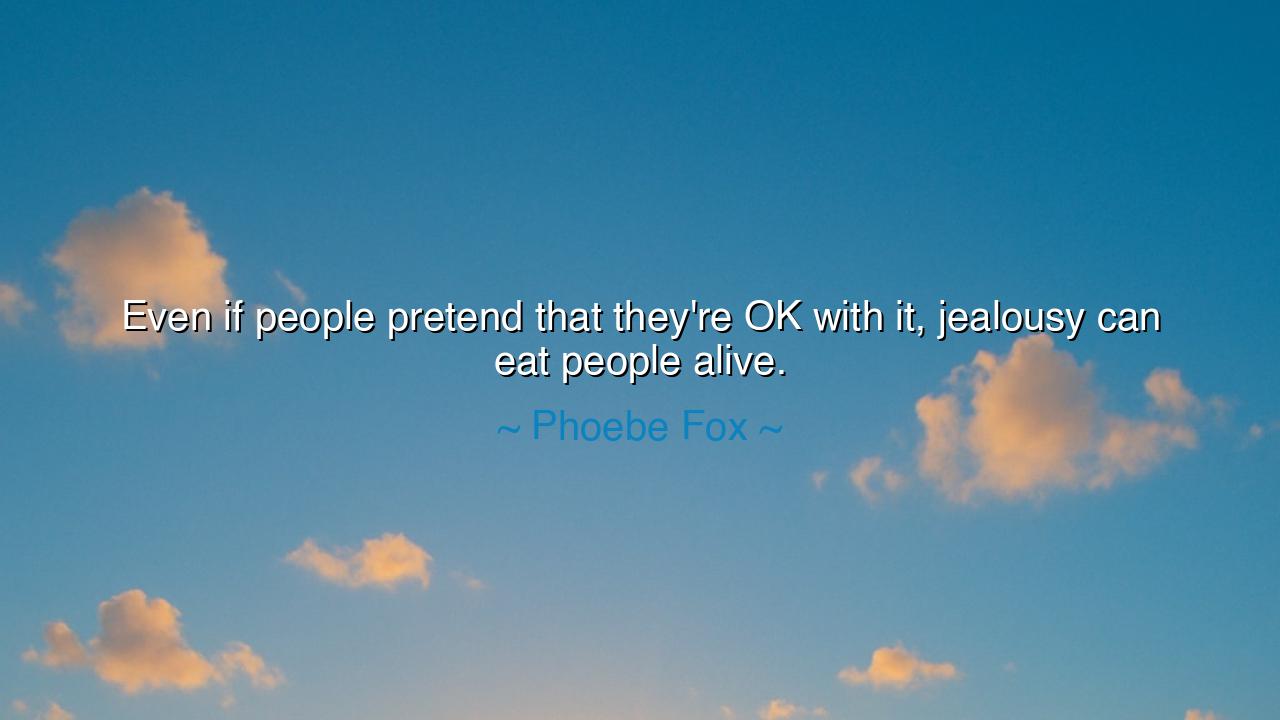
Even if people pretend that they're OK with it, jealousy can eat






There is a quiet but piercing truth in the words of Phoebe Fox, when she said: “Even if people pretend that they’re OK with it, jealousy can eat people alive.” This is not merely a statement about emotion — it is a revelation about the nature of the human heart. Jealousy, that ancient serpent of the soul, feeds not on truth but on insecurity. It gnaws from within, quietly, invisibly, until the spirit that seemed calm on the surface begins to corrode beneath its smile. Fox’s insight exposes the hypocrisy of pretense — the tragic tendency of people to conceal what they most fear, even from themselves.
In her words, Phoebe Fox gives voice to an experience as old as humanity itself. People will often say, “I’m fine,” or “It doesn’t bother me,” while their hearts burn with comparison and resentment. They wear masks of composure, thinking this denial will keep them safe. But emotions do not disappear when ignored; they ferment, growing darker and more corrosive. Jealousy, unlike anger or sadness, is rarely expressed openly — it hides beneath laughter, beneath politeness, even beneath love. It is the emotion of quiet warfare, of invisible wounds.
From the dawn of history, the ancients warned of this danger. Cain, the firstborn of man, smiled upon his brother Abel — and then slew him. His words before the act were calm, his face composed, but envy had already eaten his heart alive. The Greeks, too, named this power Phthonos, a spirit that devours the envious person from the inside, clouding judgment and poisoning joy. In every age, jealousy has been the destroyer of peace, turning friend against friend, lover against lover, and even saint against self. Fox’s quote, though spoken in a modern world of polite appearances, echoes that same eternal warning.
There are those who believe they can conquer jealousy by suppressing it, by pretending it does not exist. But denial is no cure — it is the feeding ground of the disease. The wise have always known that healing begins with honesty. To admit jealousy is not weakness, but courage. It is to say, “There is a shadow in me, and I will face it.” Those who acknowledge their envy can transform it — turning it into admiration, into motivation, even into compassion. But those who hide it only give it more power, until it consumes their peace and distorts their love.
History offers many examples of those destroyed by this inner fire. In the courts of kings and empires, jealousy has been the silent architect of treason. It was Salieri, envious of Mozart’s brilliance, who confessed that his envy made him hate the divine gift he could not possess. Though he smiled and dined beside his rival, his soul was tormented by inferiority — until his envy became his undoing. And yet, the tragedy of Salieri is not only his hatred of Mozart, but his hatred of himself — for jealousy turns its blade inward long before it strikes outward.
The wisdom of Phoebe Fox’s words lies in this truth: jealousy destroys not because it is felt, but because it is hidden. When unspoken, it festers. When acknowledged, it can be tamed. The human heart is strong enough to hold envy without surrendering to it, but only through self-awareness and humility. To admit that one is jealous is to open the window and let light into a dark room — and the darkness cannot survive the light.
Therefore, let this be the teaching for all who would live peacefully: do not pretend. If envy stirs within you, examine it. Ask what it reveals about your desires, your fears, your sense of worth. Often, jealousy is simply the soul’s cry for growth — a sign that you, too, long to create, to love, to shine. Let it guide you, not consume you. Transform it through gratitude, and it will lose its venom.
For as Phoebe Fox so wisely observed, jealousy — when denied — can eat people alive. But when faced with honesty and turned toward understanding, it becomes the fire that purifies rather than destroys. The soul that dares to confront its envy walks the path of wisdom, while the one that hides it is slowly devoured by its own shadow. Thus, the remedy is not perfection, but truth — and through truth, peace.






AAdministratorAdministrator
Welcome, honored guests. Please leave a comment, we will respond soon